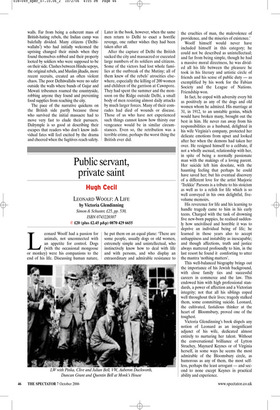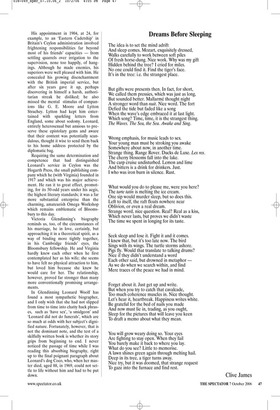Public servant, private saint
Hugh Cecil
LEONARD WOOLF: A LIFE by Victoria Glendinning Simon & Schuster, £25, pp. 530, ISBN 0743220307 ✆ £20 (plus £2.45 p&p) 0870 429 6655 Leonard Woolf had a passion for animals, not unconnected with an appetite for control. Dogs (with the occasional mongoose or monkey) were his companions to the end of his life. Discussing human nature, he put them on an equal plane: ‘There are some people, usually dogs or old women, extremely simple and unintellectual, who instinctively know how to deal with life and with persons, and who display an extraordinary and admirable resistance to His appointment in 1904, at 24, for example, to an ‘Eastern Cadetship’ in Britain’s Ceylon administration involved frightening responsibilities far beyond most of his friends’ capacities — from settling quarrels over irrigation to the supervision, none too happily, of hangings. Although he made enemies, his superiors were well pleased with him. He concealed his growing disenchantment with the British imperial service, but after six years gave it up, perhaps discovering in himself a harsh, authoritarian streak he disliked; he also missed the mental stimulus of companions like G. E. Moore and Lytton Strachey. Lytton had kept him entertained with sparkling letters from England, some about sodomy. Leonard, entirely heterosexual but anxious to preserve these epistolary gems and aware that their content was potentially scandalous, thought it wise to send them back to his home address protected by the diplomatic bag.
Requiring the same determination and competence that had distinguished Leonard’s service in Ceylon was the Hogarth Press, the small publishing company which he (with Virginia) founded in 1917 and which was his major achievement. He ran it to great effect, promoting, for its 50-odd years under his aegis, the highest literary standards; it was a far more substantial enterprise than the charming, amateurish Omega Workshop which remains emblematic of Bloomsbury to this day.
Victoria Glendinning’s biography reminds us, too, of the circumstances of his marriage, he in love, certainly, but approaching it in a theoretical spirit, as a way of binding more tightly together, in his Cambridge friends’ eyes, the Bloomsbury fellowship. He and Virginia hardly knew each other when he first contemplated her as his wife; she seems to have felt no physical attraction to him, but loved him because she knew he would care for her. The relationship, however, proved far stronger than many more conventionally promising arrangements.
In Glendinning Leonard Woolf has found a most sympathetic biographer, and I only wish that she had not slipped from time to time into chatty hack phrases, such as ‘have sex’, ‘a smidgeon’ and ‘Leonard did not do funerals’, which are so much at odds with her subject’s dignified nature. Fortunately, however, that is not the dominant note, and the test of a skilfully written book is whether its story grips from beginning to end. I never noticed the passage of time while I was reading this absorbing biography, right up to the final poignant paragraph about Leonard’s dog Coco, who, when her master died, aged 88, in 1969, could not settle to life without him and had to be put down.



















































































 Previous page
Previous page